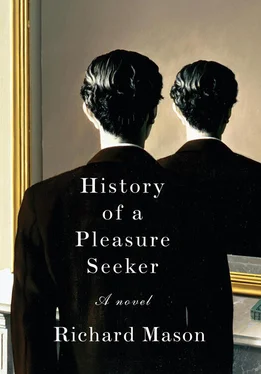The choir came in and the minister after them. During the first hymn she permitted herself the briefest glance in his direction and caught his profile, his dark brows and blue eyes, his full red lips parted in song. A wild, impulsive wish to touch him, if only for an instant, came over her. She redirected her attention to the hymnal but the thought persisted. Piet’s resonant echoing of the prayers sustained it. She threw herself into atoning for her sinful flesh but this did not cleanse her — because a secret voice, from deep within, told her that she did not sincerely repent.
The sermon drew on the Beatitudes, as recounted in the Gospel of St. Matthew. Of the eleven people in the Vermeulen-Sickerts’ pew, only Maarten and Piet listened to it with any attention, and both automatically evaluated themselves against the standards it outlined. Neither man considered himself poor in spirit, but only Maarten accepted that this might bar him from the kingdom of heaven. Piet was not sure he believed in the kingdom of heaven and wondered whether he was the only one in the congregation to harbor such doubts. No . According to Didier, Louisa Vermeulen-Sickerts was a passionate atheist.
He looked at her and understood from the quick movement of her head that she had been looking at him, too. He had not yet found a way into her affections. He had been too distracted by the dangers of Constance’s infatuation to risk a full assault. Louisa was exquisitely dressed, in a tailored linen coat of her own design that made the dresses of the other women look ostentatious and foolish. Since his second day in the house, when he had resisted the impulse to hate her, he had been struck by the confidence of her taste. Louisa’s small straw hat this morning shamed the millinery of the women around her, which was heavily burdened with flowers and dead birds. It was Constance whom the young bucks had watched as the party walked up the aisle; but the true beauty of the family was the grave, inscrutable Louisa.
His attention returned to the sermon. “Blessed are the meek, for they will inherit the earth,” the minister was saying, and this was a point with which Piet emphatically disagreed. It seemed obvious to him that the strong took advantage of the meek and left them nothing. It was better to assert oneself against Fortune, as Machiavelli advised, and as he himself had done so profitably.
As she heard the words “Blessed are the pure in heart, for they will see God,” Jacobina snapped to attention rather crossly. She had spent much of her life being pure and had not seen God yet. Her childhood nanny had been a devout Catholic, and from her she had absorbed the idea that sins are precisely quantifiable, with calibrated penances capable of removing their stain forever. As a little girl, she had secretly said a hundred Hail Marys every Saturday morning to atone for the gluttony she would display as soon as she received her pocket money, which she spent on hard, brightly colored sweets she did not share. Rising for the Eucharist, she wondered whether she might now make a similar bargain with God and win the right to think sordid thoughts without regret. Nonsense, Jacobina, she said to herself, but the censoriousness of her tone was undermined by the sight of Piet’s buttocks as he waited to receive the Host.
When the service was finished she greeted the minister more absently than usual and was so flushed that Maarten asked if anything was wrong. “I’m perfectly well,” she said; but in fact she felt afraid because she had decided to touch Piet Barol, come what may; just a little touch that no one would notice. The opportunity arose as they waited for the car, because Piet happened to be standing in front of its door as it drew up. She held out her hand to him quite naturally to be helped in. His grip was firm and dry. When she leaned against his arm, she saw his bicep swell as he took her weight. “Thank you, Mr. Barol,” she said, and their eyes met, and in that meeting was the knowledge of what had gone before.
“Je vous en prie,” said Piet.
It was insanely stupid — Piet knew this as he spoke the words, but spoke them anyway — to refer, however obliquely, to the hidden undercurrents of his first interview with Jacobina. As he followed the Rolls-Royce on foot with the other servants, he understood that he had acted dangerously, and yet … He watched Jacobina emerge from the vehicle and ascend the steps of the house.
She was undeniably an attractive woman.
He went into the hall feeling reckless. Fortunately he had Egbert’s prayers to attend to, and he turned to this chore with relief because he knew it would calm him. Egbert’s refusal to leave the house required Piet to take him through the morning service before Sunday lunch, except on the first Sunday of the month when the minister called in person to give him the sacraments. The boy was in his bedroom, his face so red Piet thought he might have a fever; but Egbert was perfectly well and red faced only because he had spent the morning in an ice-cold bath.
Between the child and the young man a wary ease had arisen, the result of Piet’s scrupulous refusal to ask Egbert to explain himself or behave as other children did. This was convenient in many respects, but the persistent avoidance of frank discussion had prevented them from becoming friends. Piet knelt on the floor and asked Egbert to open his prayer book. Together they went through the service, and the boy sought the Holy Spirit’s aid so fervently Piet felt sorry for him. He read him the Beatitudes, giving no hint of his own views, and when they had finished he sent him to his father’s study to receive a homily.
He was on the landing outside Egbert’s room, about to go to his own, when Jacobina emerged from her bedroom. Piet had loitered perhaps a little longer than he ought to have done, daring Fate; and Fate had not only called his bluff but doubled its money because Jacobina was wearing the dress of apple-green wool she had worn at their first encounter.
“Good afternoon, Mr. Barol. Will you be lunching with us?” Before changing, Jacobina had written a check for fifty guilders and asked Agneta to take it to the Civic Orphanage in the manner of a medieval merchant buying a papal indulgence. The money was drawn on her own account and had come from her father, not her husband.
“I should be delighted to, mevrouw .”
Monsieur la Chaume had outdone himself. They ate turtle consommé and corbeilles Polonaises , followed by larks stuffed with pistachio and foie gras. The Château Neuf du Pape, of which Piet had three glasses, made the pursuit of pleasure seem obligatory. There was a wildness in the way Jacobina laughed at Constance’s jokes that combined with the message of the dress she had chosen to tell him that he need only make a sign. The invitation, delivered so tracelessly, added a helping of flattered vanity to the assortment of delights offered by the elegant room, the fine food and the deference of the servants.
As Didier bowed, looked into his eyes, smiled, refilled his glass, and bowed again, Piet marveled at how far he had come from his father’s dank and gloomy house, cleaned once a week by a woman with dandruff and chilblains. He thought contemptuously of the morning’s sermon and of the poor fools who exchange their worldly ambitions for the vague promises of heaven.
A gâteau de trois-frères appeared and an exquisite champagne jelly, in which white elderflowers were magically suspended. Piet had watched the jelly being made, layer on fragile layer, the day before. He plunged his fork into it like a barbarian at the gates of Rome, destroying the labors of others for no better reason than this: he could.
“Some champagne, Monsieur Blok,” said Maarten, who was in excellent spirits. He did no work on Sundays and was looking forward to a pleasantly drunken nap. “My dear, I insist you take some.” He stroked his wife’s hand. “You haven’t been yourself all morning. It’ll settle your digestion.” He waved at the butler, in unconscious imitation of the rich men he had envied in the days before he could afford to be commanding with sommeliers. “Let us have the Moët Brut Impérial, 1900.” He turned to Piet. “A superlative year, in my opinion.”
Читать дальше












